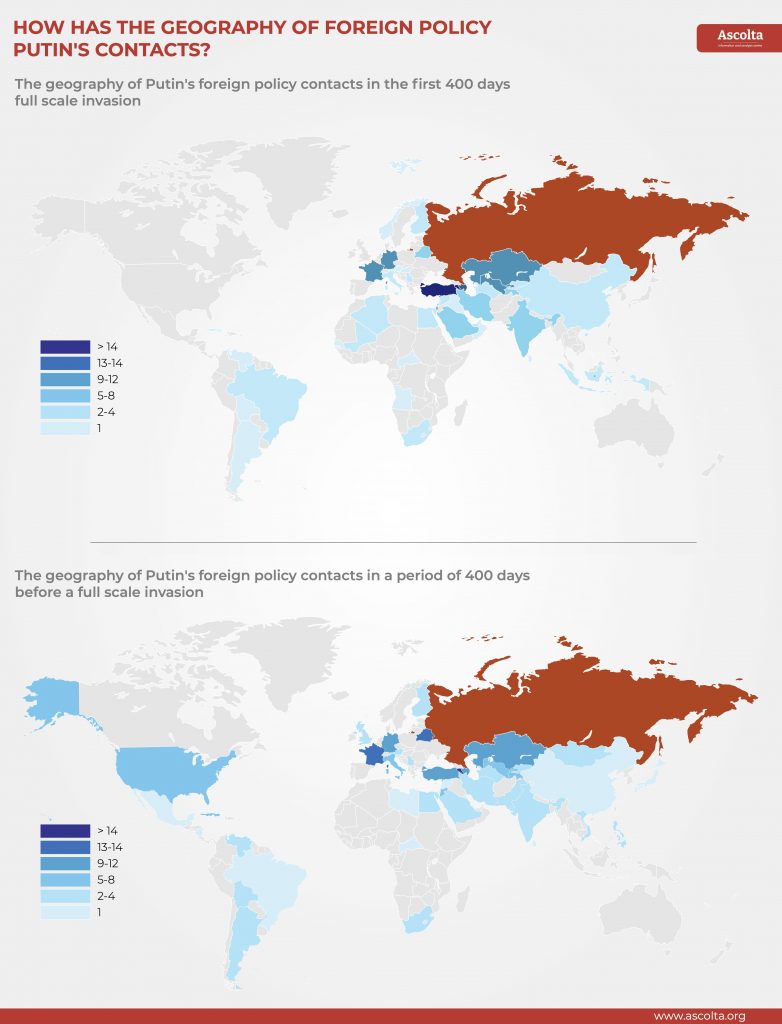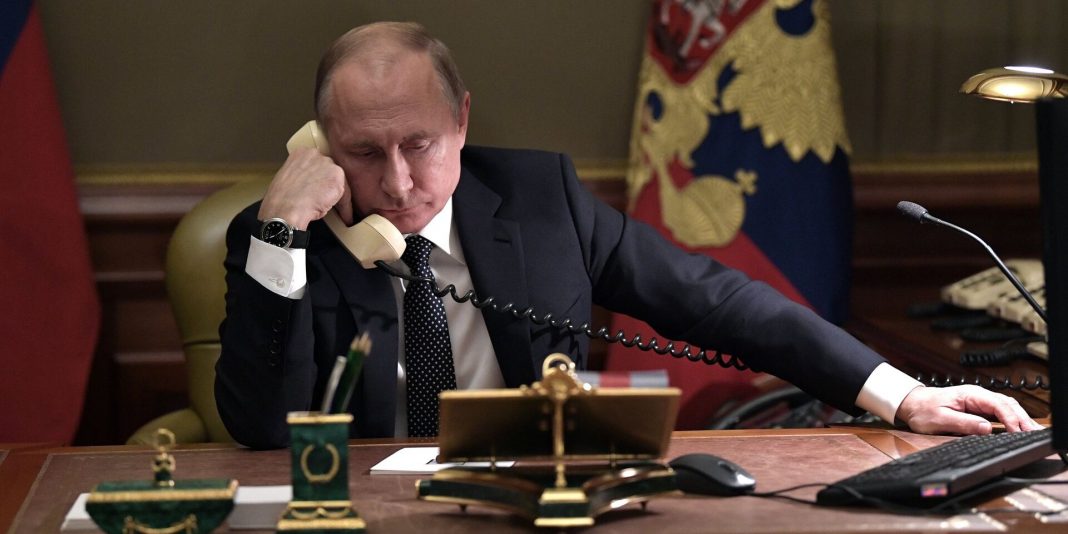The full-scale invasion of Russian troops on the territory of Ukraine provoked an immediate reaction from the United Nations, which, despite the veto imposed by the Russian side, already on March 2, 2022, adopted Resolution ES-11/1 condemning the attack on Ukraine, co-sponsored by 96 countries. This document clearly demonstrated the world community’s reaction to Putin’s ferocious actions: Russia’s attack on Ukraine was condemned by 141 states, another 35 abstained, and representatives of 12 states were not present during the voting. Only five states opposed the resolution, that is, in support of Russia’s actions.
This Content Is Only For Subscribers
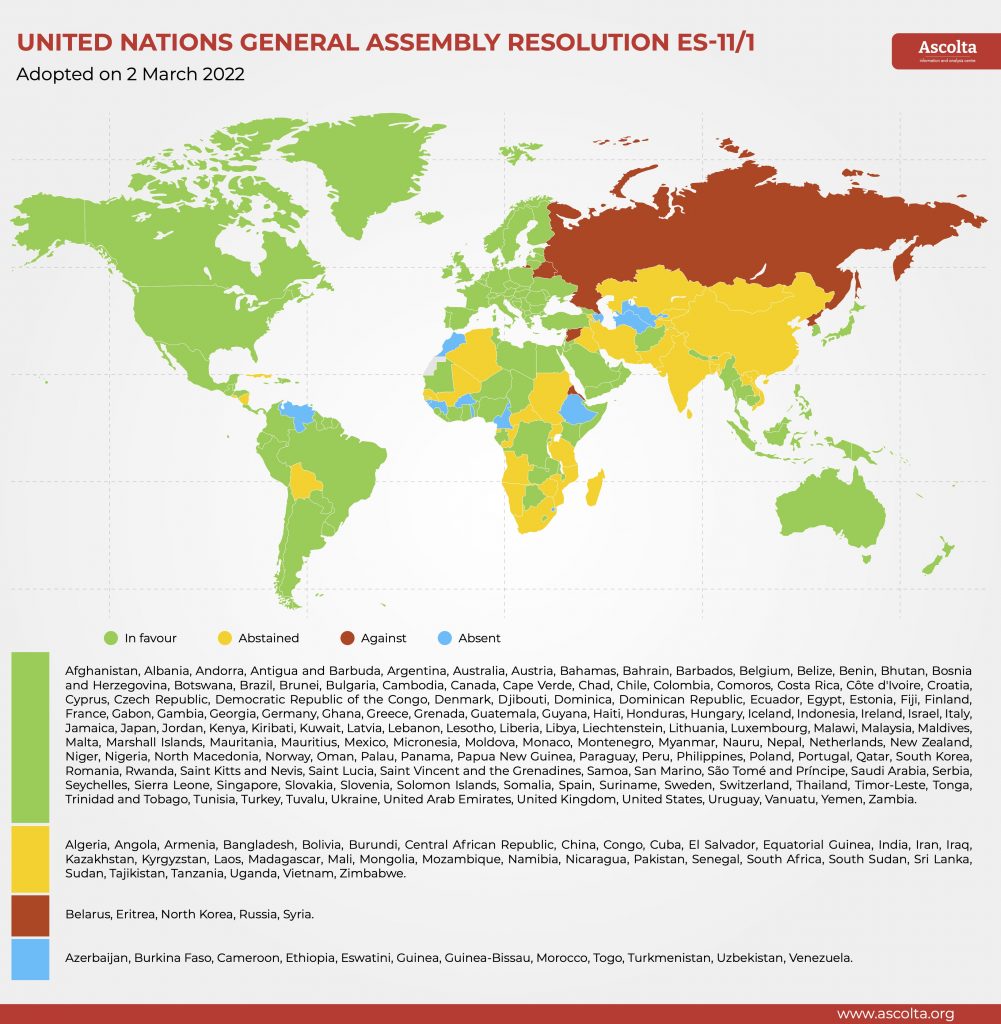
At the same time, the leaders of several states that condemned Russia’s actions preferred not only to maintain diplomatic relations with Moscow but also to maintain further communication with Vladimir Putin. First of all, we are talking about telephone conversations between the Russian president and foreign colleagues since the number of his visits by Putin to other states has significantly decreased even during the COVID-19 pandemic, and over the past year, the Russian president has thoroughly preferred to limit himself to the near abroad.
After 400 days of the Russian-Ukrainian war, the world community has not managed to achieve the complete isolation of the Russian president. Moreover, in some states with predominantly anti-Western sentiments, Putin’s actions increasingly find tacit approval or support.
In this article, Ascolta counted the number of telephone conversations and face-to-face meetings between Vladimir Putin and leaders of other states that took place from February 24, 2022, to March 30, 2023 – that is, in the first 400 days of a full-scale invasion of the Russian army into the territory of Ukraine.
ALWAYS UP TO TALK: HOW MANY PHONE CONVERSATIONS DID PUTIN HAVE IN THE 400 DAYS OF WAR?
Almost 12 hours after the announcement of the so-called “special military operation”, at 17:00 Moscow time, Vladimir Putin met with Pakistani Prime Minister Imran Khan in the Kremlin. According to an official report on the Kremlin website, the leaders of the two states discussed the current situation in South Asia. At the same time, massive missile strikes were inflicted on the territory of Ukraine, and columns of Russian military equipment were actively advancing in the northern and southern regions of the country.
Four hours later, at 21:05 Moscow time, Vladimir Putin had his first telephone conversation. His interlocutor was Iranian President Seyyed Ebrahim Raisi. The conversation was short, since already at 21:20, Putin’s press service announced the beginning of his conversation with Indian Prime Minister Narendra Modi. The last telephone conversation with the Russian president occurred two hours later that day. This time, French President Emmanuel Macron became his interlocutor. Looking ahead, it is worth noting that the French president became the leader in the number of telephone conversations with Putin in 2022.
In total, during the 400 days of the war, Vladimir Putin had 183 official telephone conversations with the leaders of other states. At the same time, this figure does not consider those conversations that were classified or not publicly disclosed (some of them, Ascolta plans to describe in their following publications). In addition, Putin made several official visits to other states, took part in several summits and informally met with the leaders of other states.
Such activities of the Russian president provide an opportunity to determine not only Putin’s circle of contacts but also demonstrate several trends in forming regional and global alliances. Moreover, an analysis of the regularity of calls and their geography makes it possible to identify the main directions in which Russia operates in the international arena.
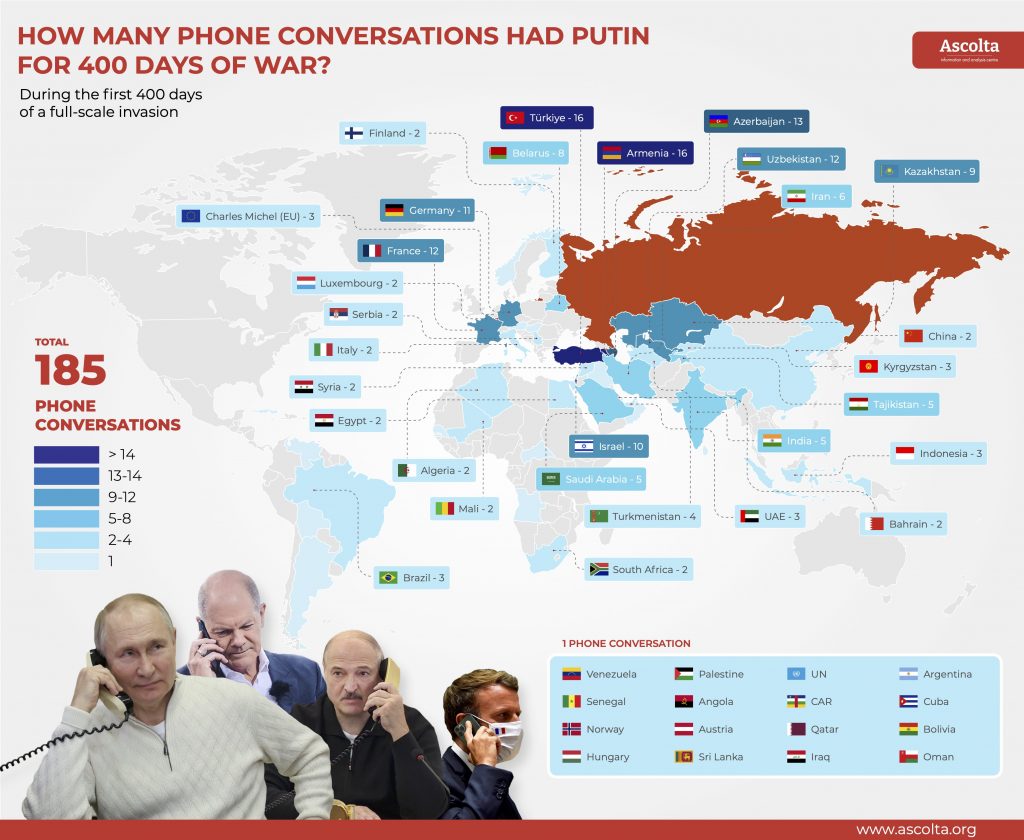
PUTIN’S FOREIGN POLICY
We suggest to divide Putin’s communication with foreign colleagues into four conditional groups: “Ukrainian issue”, “new alliances”, “resolution of regional conflicts”, and “other”. It was in these areas that the Russian president worked most actively.
“UKRAINIAN QUESTION”: WHO IS TRYING TO AGREE WITH PUTIN ON PEACE
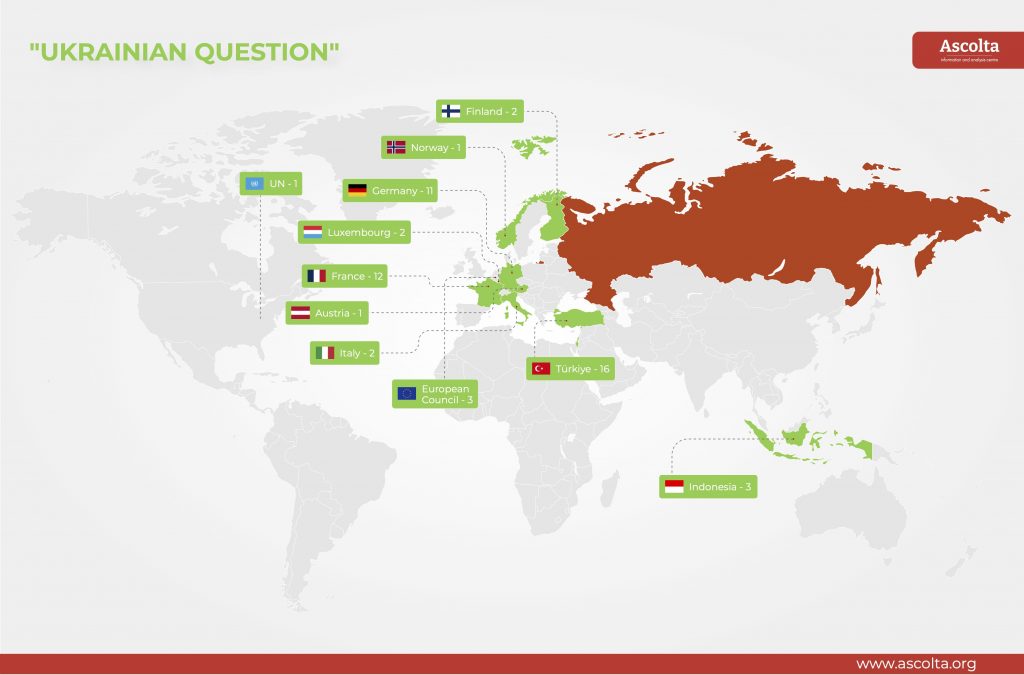
From the first day of the full-scale invasion of Russian troops into Ukraine, Western leaders were divided into those who tried to isolate Russia as much as possible and cut off any communication with it and those who tried to influence Putin through diplomacy. Among the representatives of the second camp, the most active diplomatic position was demonstrated by French President Emmanuel Macron (12 telephone conversations) and German Chancellor Olaf Scholz (11 telephone conversations). Moreover, on March 10 and May 28, 2022, Putin, Macron, and Scholz held joint calls to discuss Ukrainian topics. Similar “conferences” were held shortly before Russia invaded Ukraine but did not produce the desired result.
At the end of 2022, Emmanuel Macron took first place in the list of the most frequent communications with Vladimir Putin (12 telephone conversations). Yet, he succumbed to criticism from Ukraine and other Western leaders.
Notably, since the beginning of 2023, neither Macron nor Scholz had a single telephone conversation with Putin.
Among the absolute leaders in terms of the number of contacts with Putin in this group is Turkish President Recep Tayyip Erdogan (16 telephone conversations). In addition, during the war between Russia and Ukraine, the Russian and Turkish leaders held four personal meetings in Tehran (19.07), Sochi (05.08), Samarkand (16.09) and Astana (13.10). Erdogan has repeatedly acted as an intermediary between the West and Moscow on the Ukrainian issue. He remains the leading lobbyist for the Black Sea Grain Initiative (“the grain deal”), implemented on July 22, 2022. It is noteworthy that the first meeting between Erdogan and Putin took place on July 19 in Tehran – that is, three days before the launch of the “grain deal”. Moreover, on March 26, 2023, another telephone conversation took place between the Russian and Turkish leaders. Ascolta’s sources note that during this conversation, Putin’s visit to Turkey, which may be scheduled shortly, could be discussed.
Israel also tried to act as an active negotiator. Putin had eight telephone conversations with former Prime Minister Naftali Bennett, and on March 5, 2022, they met with him in Moscow. In early February 2023, in an interview with journalist Hanoch Daum, Bennett stated that during his visit to Moscow, he received guarantees from Vladimir Putin not to kill Ukrainian President Volodymyr Zelensky. In addition, on August 9, 2022, Vladimir Putin had a telephone conversation with Israeli President Yitzhak Herzog. Finally, on December 22, he spoke with Benjamin Netanyahu, who officially took office as Prime Minister of Israel a week later.
During the fighting in Ukraine, the Russian president also had telephone conversations with Italy, Norway, Finland, Luxembourg and Austria leaders. In addition, I spoke three times with the Head of the European Council, Charles Michel, and had one telephone conversation with UN Secretary-General António Guterres. Indonesian President Joko Widodo also tried to act as a negotiator. He spoke with Putin on the phone three times, and on July 29, he laid the bed in Ukraine and met with Vladimir Zelensky, after which he went to Moscow to meet with Putin.
“NEW UNIONS”: WITH WHOM PUTIN SEES THE FUTURE OF RUSSIA
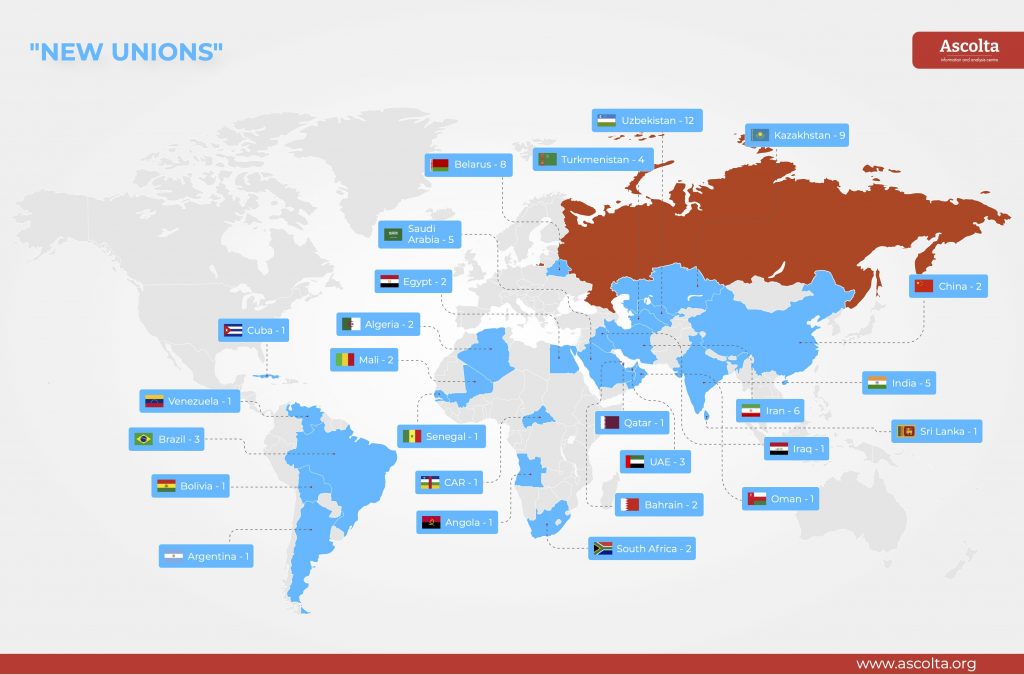
Long before the start of the so-called “special military operation,” Vladimir Putin repeatedly stated the need to change the world order, which, in his opinion, cannot be built on the sole dominance of the United States. At the same time, China, whose leader rather demonstrated tacit agreement with such statements, was listed in Russia as Putin’s main ally. Twenty days before the invasion of Russian troops in Ukraine, Putin visited Beijing and took part in the Winter Olympic Games opening ceremony. Later, many analysts will agree that during this visit, Xi Jinping approved of Putin’s actions concerning Ukraine but asked to postpone them until the end of the Olympics.
At the same time, after the start of the war, Xi Jinping will be only the sixth leader with whom Putin will have a telephone conversation. Although, this nuance is unlikely to impact the global picture. In general, it can be noted that throughout the Russian-Ukrainian war, the issue of China remains fundamental in predicting the further development of the situation. So, at first, many expected the results of Xi Jinping’s re-election for another term as the Chairman of the PRC. Furthermore, they predicted more active participation of China in the Ukrainian issue after the Congress of the National People’s Congress of China, which took place in mid-March and completed the formation of the party leadership. Further, the whole world closely followed Xi Jinping’s visit to Moscow, which finally demonstrated the high level of rapprochement between the two states. Currently, we can observe an active synchronisation of actions and positions of Moscow and Beijing around the so-called peace plan proposed by Xi Jinping on the anniversary of the start of Russia’s full-scale invasion of Ukraine.
Following Xi Jinping’s visit to Moscow, the leaders of China and Russia issued a joint statement that refuted plans to create a military bloc. At the same time, Moscow and Beijing actively support the idea of a multipolar world and are actively working to unite a conditional anti-Western coalition, which consists of the states of Asia, the Middle East, Africa and partly Latin America.
In the same direction, Putin is trying to build new alliances after a virtually complete break in relations with the collective West. These unions can be divided into several subgroups:
- The “China-Russia-Iran” Union
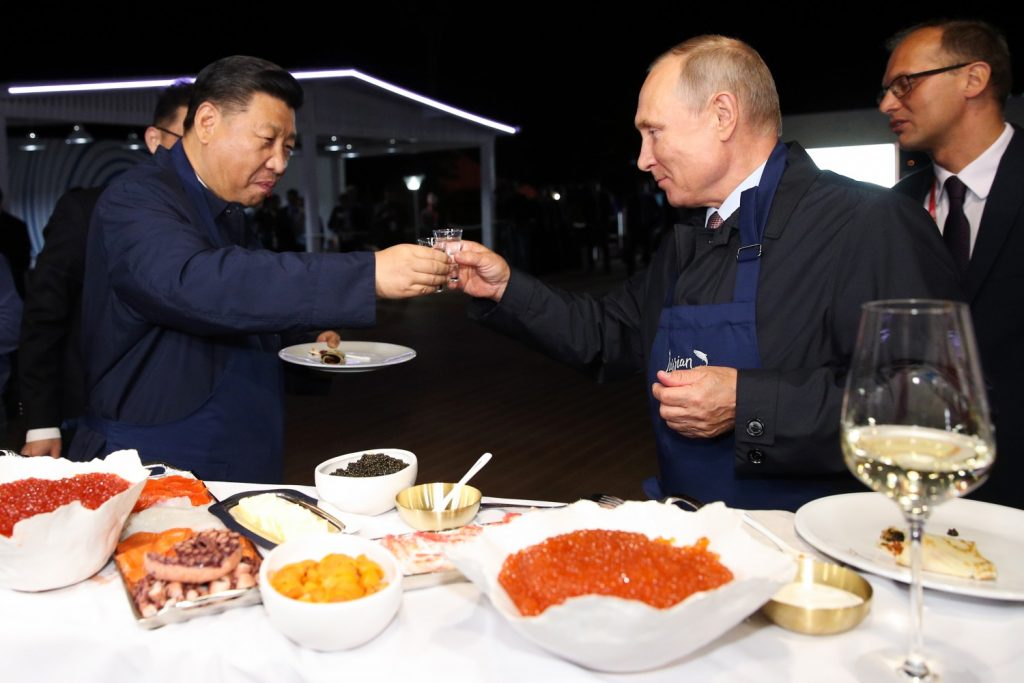
On March 29, U.S. Joint Chiefs Chairman General Mark Milley told the House Armed Services Committee that China, Russia, and Iran are “coming closer” and will be a constant problem for years. This statement was just another confirmation of creating such an alliance, which sees its goal as creating a new pole of influence and attracting other regional players to it.
It is important to note that on the eve of Xi Jinping’s visit to Moscow, China could demonstrate effective mediation in the negotiations between Iran and Saudi Arabia, which agreed to restore diplomatic relations, severed in 2016. The parties in the statement expressed their gratitude to China, as well as to Iraq and Oman, where negotiations between Tehran and Riyadh also took place. Several sources note Russia’s role in mediation in this process.
- The Union State with Belarus
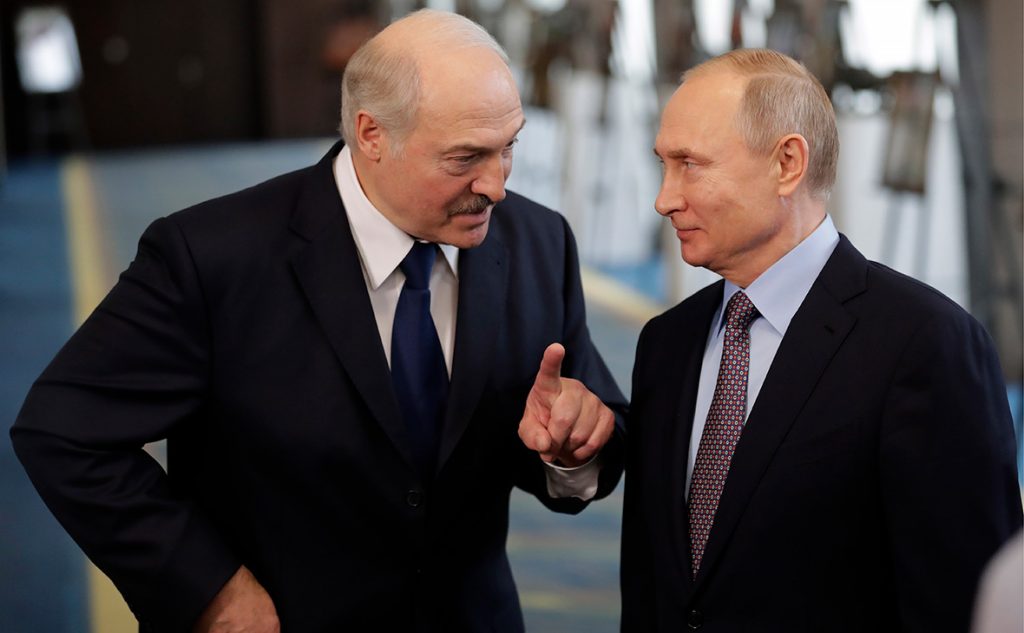
The Russian-Ukrainian war significantly intensified the processes for implementing the union state between Russia and Belarus. Over the past year, Moscow and Minsk have made significant progress in economic and judicial integration matters. True, as of the end of March 2023, only eight out of 28 programs adopted at the beginning of 2022 within the framework of the Union State were fully implemented. The other day, Russian Prime Minister Mikhail Mishustin said that a meeting of the Supreme State Council of the Union State with the participation of Putin and Lukashenko would be held on April 6. Following its results, the parties would be able to make significant progress on several issues and the topic of the practical implementation of union programs.
At the same time, one should not exclude the severe influence of Beijing on the relationship between Minsk and Moscow. Lukashenka is increasingly becoming a personal envoy of Xi Jinping and is trying to act as his mediator in Europe. This role allows him to dictate his position in relations with Putin and not go for a complete loss of sovereignty by uniting with Russia. In particular, this also applies to the refusal of the participation of the Belarusian army in hostilities on the territory of Ukraine. Moreover, Beijing is considering Minsk as a future economic centre concerning Europe, as evidenced by creating an industrial park near the Belarusian capital with a special economic zone, “Great Stone”.
On March 25, Putin announced that Russia intends to deploy tactical nuclear weapons on the territory of Belarus. Moreover, its storage is planned to be built before July 1 this year. Considering that this statement was made a few days after Xi Jinping visited Moscow, it can be assumed that such actions were agreed upon between Beijing, Moscow and Minsk.
- The Triple Alliance of Russia-Kazakhstan-Uzbekistan
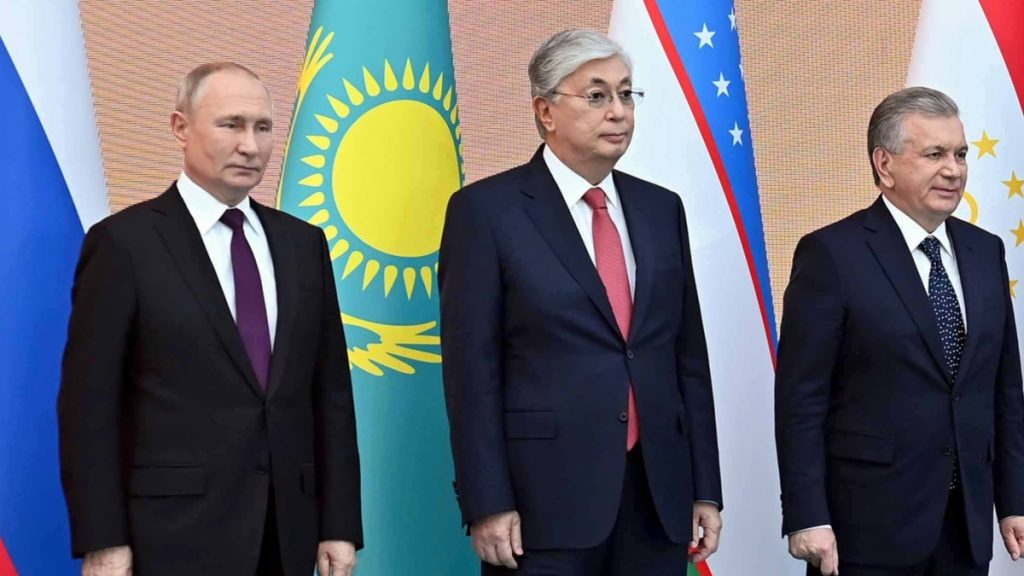
Since last year, Russia has been actively lobbying to create a triple gas union with the participation of Kazakhstan and Uzbekistan, which will significantly increase gas supplies to China. This issue was actively discussed in October last year at the Russia-Central Asia summit and at the beginning of December 2022 at the EAEU summit in Bishkek (Kyrgyzstan).
Recently, this gas transportation project has become increasingly relevant and has every chance of being implemented. The only question is how pragmatic a position Tokayev can build, considering all the interests of China, Russia and several transnational corporations that have a noticeable influence on some western regions of Kazakhstan.
It is essential to consider that at the end of February 2023, Anthony Blinken visited Kazakhstan and Uzbekistan. The main goal of the Central Asian tour of the US Secretary of State was to convince Astana and Tashkent of the need to implement anti-Russian sanctions and keep as much distance from Russia as possible. A few days later, the meeting of the presidents of Kazakhstan and Uzbekistan took place in Kazakh Shymkent. Following the meeting, Tokayev and Mirziyoyev confirmed their position on creating a multimodal transport corridor across the Caspian Sea, which Blinken strongly opposed. Kazakhstan and Uzbekistan also confirmed their participation in the agreement on the “Green Corridor” in the transport field, which will include Russia, Kyrgyzstan, Turkmenistan, Uzbekistan, Iran and Kazakhstan. Also, after the meeting, both leaders of the states held telephone conversations with Putin.
We can talk about the situational victory of the Russian president in the fight against the United States for an area of interest in Central Asia. Nine telephone conversations with the president of Kazakhstan and 12 with the presidents of Uzbekistan have borne fruit. At the same time, given the complexity of this region, one should not count on the long-term stability of such alliances.
- The countries of the Sahel and the African continent
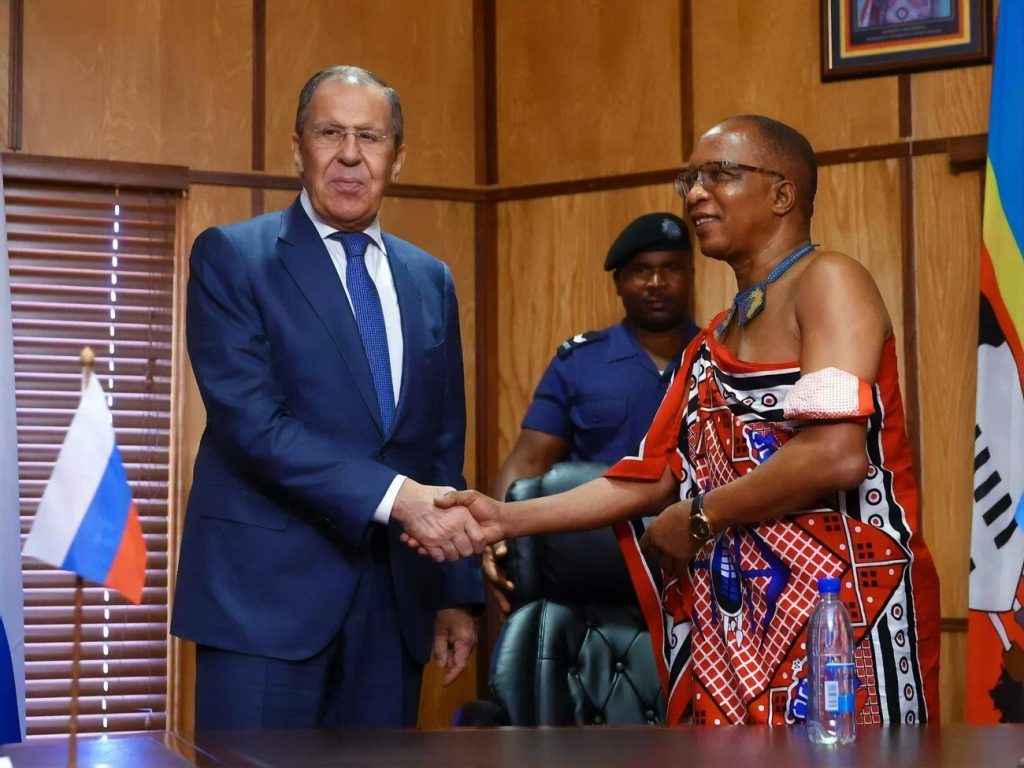
Russia’s interest in the Sahel countries is traditional. Wagner PMCs have an active presence in Chad and Mali (as well as in the Central African Republic and the Democratic Republic of the Congo). In 2021, due to a military coup supported by the Wagnerites, Colonel Assimi Goita came to power in Mali. In May 2022, the Wagnerites helped Goita suppress a military rebellion inspired by France (in fact, the French do not hide their desire to regain control over Mali, which they lost back in the early 2010s as a result of the “civil war” in Mali, or rather the struggle for control over spheres of influence in the Sahel).
Notably, the United States and France announced their programs for the Sahel (economic, environmental) in 2021. That is, from the point of view of the Russian Federation, strengthening its presence in this region is a new challenge to the West. The visit of the Minister of Foreign Affairs of the Russian Federation, Sergey Lavrov, to this region, which took place at the end of February 2023, is especially interesting against this background. Moreover, Lavrov arrived in Sudan on the same day as the delegation of six ambassadors from the EU and the US. At the same time, Bloomberg stressed that the visit of the six ambassadors was prepared for a very long time and carefully, but Lavrov’s visit nullified all diplomatic efforts. The ambassadors left virtually with nothing. Thus, Sudan’s leadership clarified its priorities, and Russia received a small diplomatic victory. The visit to Mauritania, considered the region’s main NATO ally, is also noteworthy. Most recently (in October last year), US Deputy Secretary of State Victoria Nuland visited here. In the summer of 2021, the Mauritanian government signed an agreement on military-technical cooperation with Russia.
The countries of the Sahel (Burkina Faso, Mauritania, Mali, Niger and Chad), from the point of view of the West, play a significant role in combating the threat of Islamic terrorism and its intensification in the rest of the continent. Therefore, the Regin of the Sahel is important in terms of its impact on the political life of Africa as a whole. One can also add to this a number of other African states whose leaders the Russian president has been willingly in contact with lately.
Such contacts should not be underestimated, primitivising them and reducing them to “Russia can only communicate with African leaders – no one accepts them.” In many ways, this is a defining direction, since a lot depends on the position of African states today: from the development of markets to voting in the UN. In addition, the African continent is a conflict of interests of at least four major players – the United States, China, France and Russia. Interaction in this region also determines positions on other issues (in particular, the clash between France and Russia in Mali seriously affects the climate of relations between Paris and Moscow on the Ukrainian issue).
- Expansion of political and economic alliances
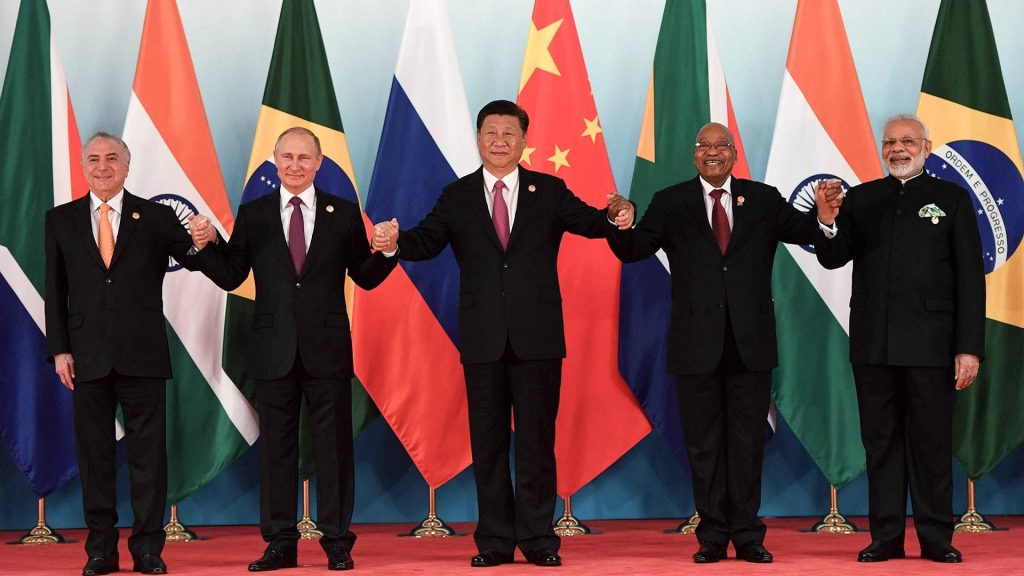
Putin is also notably active in trying to expand political or economic alliances. In particular, we are talking about the interstate association of Brazil, Russia, India, China and South Africa (BRICS). In essence, this association aims to create a new economic reality on a global scale, where China and India will be the dominant global suppliers of industrial goods and services. At the same time, Brazil and Russia will be the leading suppliers of raw materials.
Notably, at the end of June 2022, Argentina and Iran applied to join the BRICS. And in July of the same year, Turkey, Egypt and Saudi Arabia announced their desire to join the organisation. Also, in November 2022, Algeria filed an official application to join the BRICS. It is worth noting that the Russian president has maintained contact with the leaders of all BRICS member states and those who have expressed a desire to join the organisation and have had several telephone conversations lately. Moreover, on March 3, 2023, the Minister of Foreign Affairs of South Africa, Naledi Pandor, confirmed the invitation of Russian President Vladimir Putin to the BRICS summit, despite the ICC warrant.
- Middle East and energy alliances
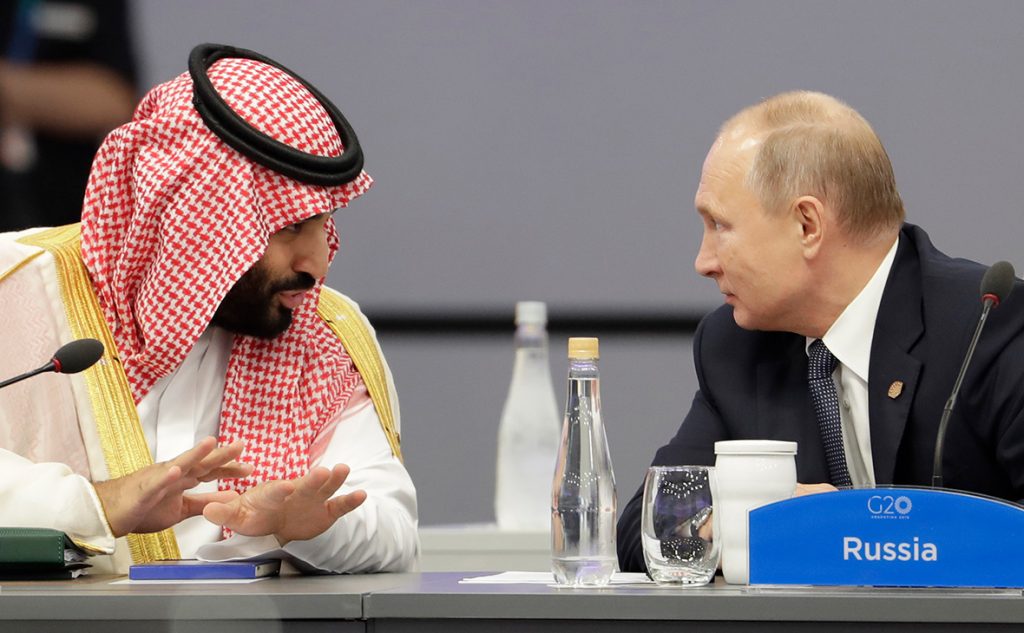
Putin is also trying to build closer alliances in the Middle East. Given the peculiarity of this region, for which Western democratic values are not a priority in determining the foreign policy vector, as well as the availability of tools to influence the global energy market, the Russian president demonstrates a desire to strengthen friendly relations with Middle Eastern leaders.
The Organisation of the Petroleum Exporting Countries (OPEC), as well as OPEC+, which includes Russia, during the Russian-Ukrainian war repeatedly made decisions to limit oil production, which is not an act of direct support for Russia’s actions, but at the same time goes to cut with the interests of the collective West. In addition, the increased presence of China in this region also affects the loss of the position of the United States.
Moreover, after the visit of the American president to Israel and Saudi Arabia, which took place in mid-July 2022, it became obvious that Washington failed to achieve the desired results in strengthening its position in the region. Biden failed to convince Saudi Arabia to sharply increase oil production, and his attempts to create a common regional security system for Arab countries and Israel to confront Iran stumbled upon the active peacekeeping actions of China, which managed to achieve a situational improvement in relations between Tehran and Riyadh.
At the same time, the United Arab Emirates demonstrated effective mediation in the negotiation process between Moscow and Kyiv on the exchange of prisoners. In early February 2023, the Russian side announced the assistance of the authorities of the United Arab Emirates in the return of 63 Russian servicemen. Moreover, in December 2022, at Abu Dhabi International Airport, Russian businessman Viktor Bout, who was serving a prison term in the United States, was exchanged for American basketball player Brittney Griner, who had previously been convicted in Russia on drug smuggling charges.
“RESOLUTION OF REGIONAL CONFLICTS”: PUTIN’S PEACEKEEPING ACTIVITIES
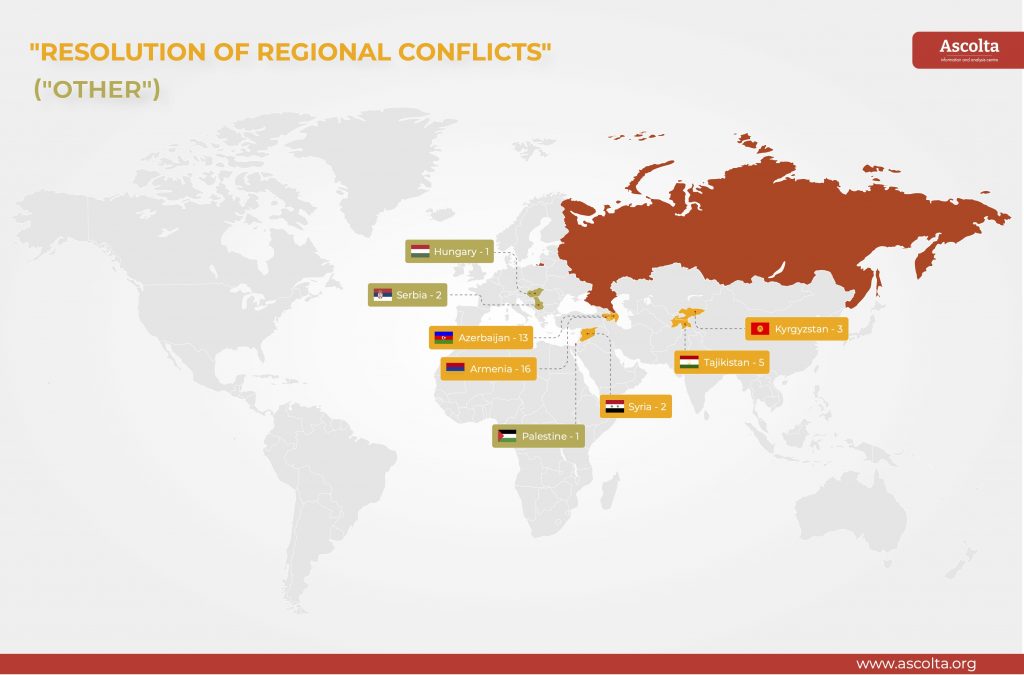
During the Russian-Ukrainian war, Putin is trying to actively influence the resolution of local conflicts in which Russia has a direct influence on at least one of the parties:
- The Armenian-Azerbaijani conflict
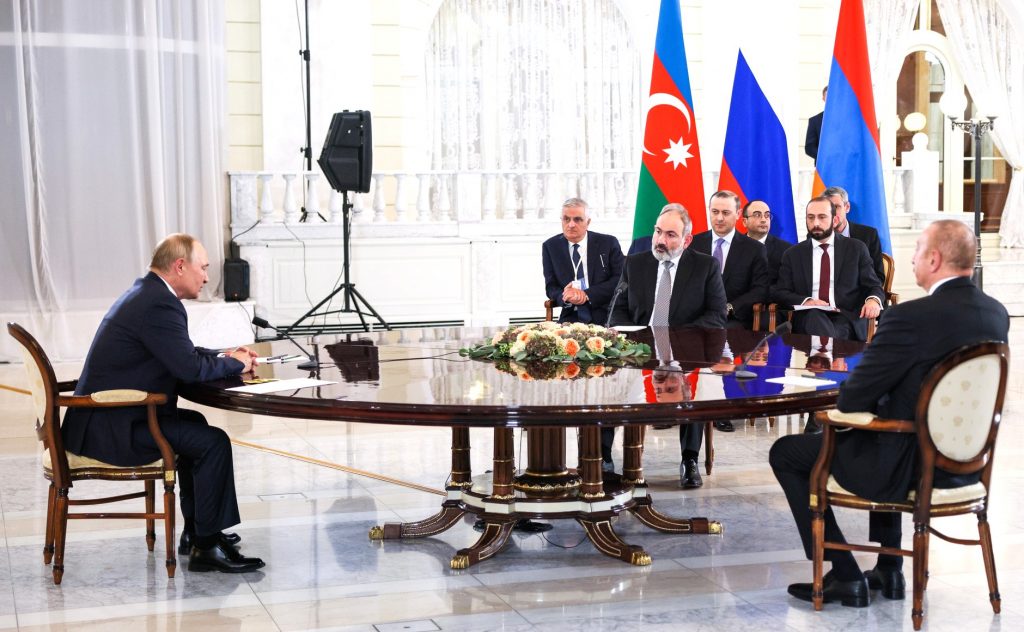
In this situation, Putin faced several challenges simultaneously, requiring searching for complex solutions. First, the active support of Armenia harms relations between Moscow and Baku, affecting plans to implement the strategy for the Caspian region (this also includes the growing escalation between Azerbaijan and Iran). Notably, the Prime Minister of Armenia became one of Putin’s most frequent interlocutors according to the number of telephone conversations during the hostilities in Ukraine – 16 calls. Moreover, Putin and Pashinyan held 11 personal meetings over the same period. At the same time, the Russian president spoke with his Azerbaijani counterpart Ilham Aliyev 13 times and held seven face-to-face meetings, which also testify to the very warm relations between the leaders of the two states.
Secondly, active attempts to resolve the Armenian-Azerbaijani conflict are also being made in the West. Thus, in mid-February 2023, on the platform of the Munich Security Conference, a meeting was held between Azerbaijani President Ilham Aliyev and Armenian Prime Minister Nikol Pashinyan. The US Secretary of State, Anthony Blinken, mediated the event. Moreover, due to the meeting, the parties announced that they had reached several agreements, which could make it possible to sign a peace treaty shortly. But, of course, such mediation is a negative sign for Moscow and Putin personally.
- The Kyrgyz-Tajik conflict
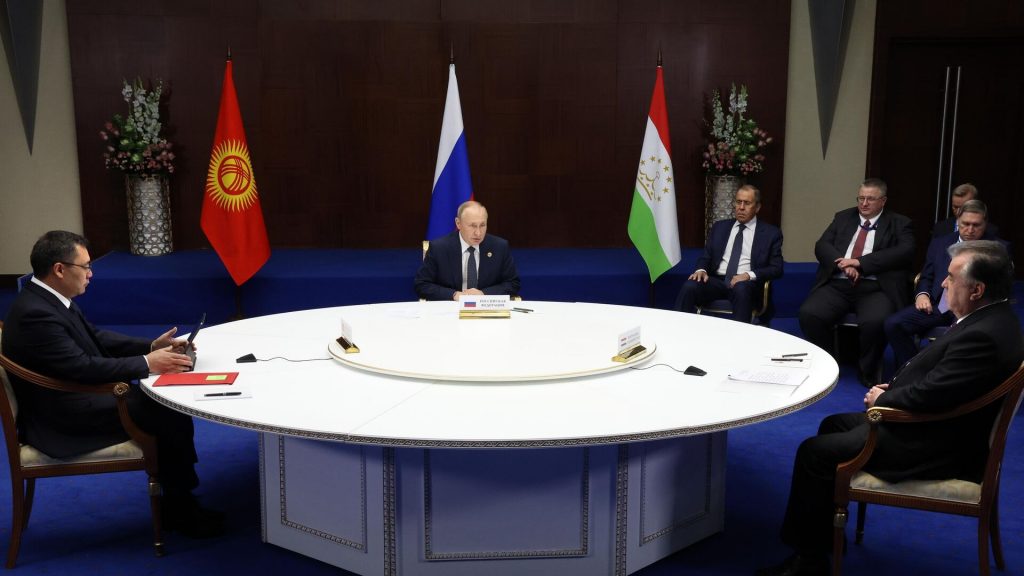
No less important, from the point of view of regional stability in Central Asia, for Putin is the issue of resolving the situation between Kyrgyzstan and Tajikistan. Unfortunately, he devoted much less time to this direction – five telephone conversations with the President of Tajikistan, Emomali Rahmon, and three with the President of Kyrgyzstan, Sadyr Japarov. At the same time, in 2022, Putin visited both states. Moreover, the visit to Tajikistan was Putin’s first foreign visit since the start of a full-scale invasion of the Russian army into Ukraine.
It is worth recalling the Russia-Central Asia summit held in October 2022. Emomali Rahmon’s appeal, in which he criticised Putin for improper treatment of the states of Central Asia, was perceived by many as an open conflict of regional proportions. But, at the same time, we can talk about very strained, but rather partnership relations at the regional level, which allows us to build a different system of relationships.
- The Syrian issue
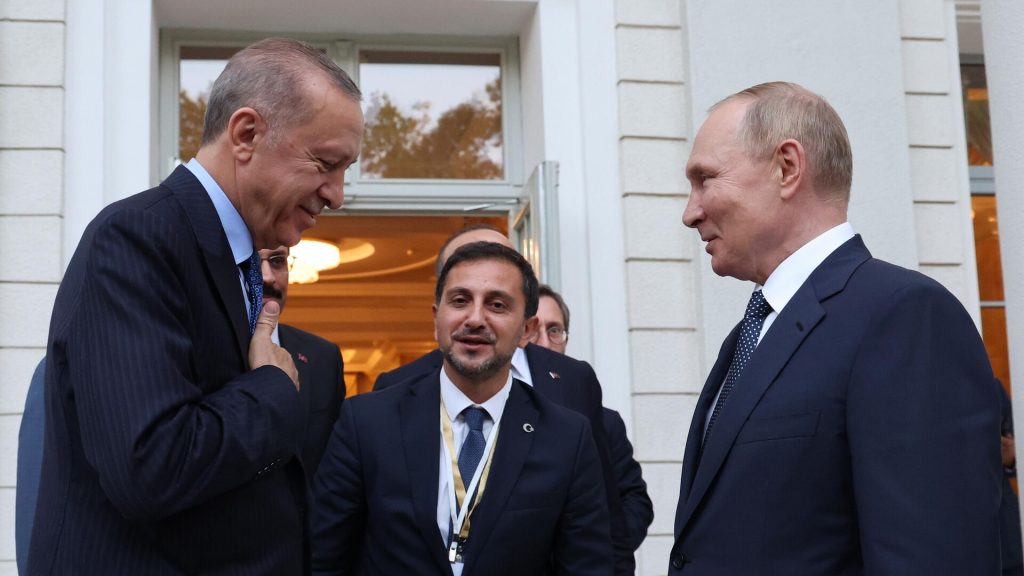
The issue of Syria remains no less important for Putin. The activation of the “Astana format” allows the Russian president not only to maintain influence on the processes in the region but also neutralises the position of the United States. At the same time, paying attention to the contradictions between Moscow and Ankara is essential, which does not allow significant progress in this direction.
In any case, the attempt to resolve the Syrian conflict has become one of the critical areas in Putin’s foreign policy activities. Moreover, shortly, it is planned to hold quadripartite consultations at the level of deputy foreign ministers of Russia, Syria, Turkey and Iran, which will be held in Moscow. At the same time, it is likely that during Putin’s visit to Ankara, a summit of the leaders of the four states may also take place, during which specific progress will be made on the Syrian issue.
HOW PUTIN’S CIRCLE OF COMMUNICATIONS CHANGED AFTER THE BEGINNING OF THE RUSSIAN-UKRAINIAN WAR
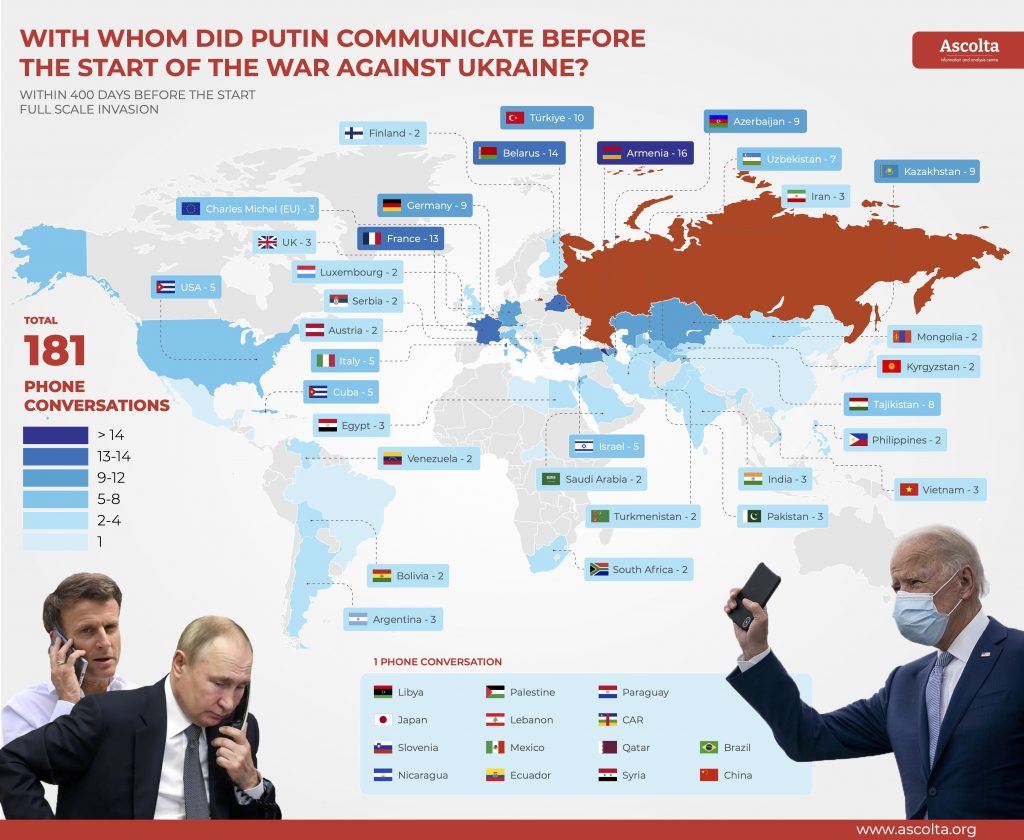
An analysis of a similar period before the start of the so-called “special military operation” shows that over the past 400 days, the number of Putin’s telephone conversations with leaders of other states has even increased. True, significant changes are noted in the geography of contacts. So, in the period from mid-January 2021 to February 23, 2022 (that is, 400 days before the start of the war), the Russian president had 181 telephone conversations with the leaders of other states. At the same time, from February 24 to March 30 (the first 400 days of the war), Putin had four more telephone conversations – 185.
At the same time, there was no official contact with US President Joe Biden. However, in the previous period, the leaders of the two states had five telephone conversations, met in Geneva (Switzerland) in June 2021, and also talked via video link in December 2021.
Putin also lost contact with the British Prime Minister, although he spoke with Boris Johnson on the phone three times before the start of the war. Apart from the European states, after the invasion of Russian troops in Ukraine, Putin’s contacts with the leaders of Latin America have significantly decreased.
Notably, almost two times fewer telephone conversations, compared to the same period before the start of the war, took place between Putin and his closest associate Alexander Lukashenko. At the same time, the number of face-to-face meetings increased.
